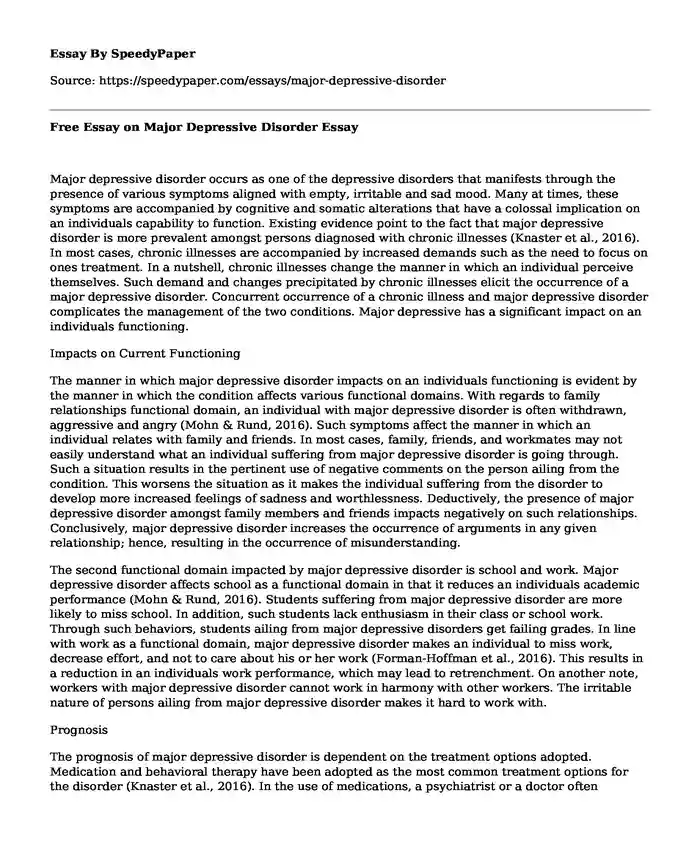
| Type of paper: | Essay |
| Categories: | Psychology Personality Depression Disorder |
| Pages: | 3 |
| Wordcount: | 734 words |
Major depressive disorder occurs as one of the depressive disorders that manifests through the presence of various symptoms aligned with empty, irritable and sad mood. Many at times, these symptoms are accompanied by cognitive and somatic alterations that have a colossal implication on an individuals capability to function. Existing evidence point to the fact that major depressive disorder is more prevalent amongst persons diagnosed with chronic illnesses (Knaster et al., 2016). In most cases, chronic illnesses are accompanied by increased demands such as the need to focus on ones treatment. In a nutshell, chronic illnesses change the manner in which an individual perceive themselves. Such demand and changes precipitated by chronic illnesses elicit the occurrence of a major depressive disorder. Concurrent occurrence of a chronic illness and major depressive disorder complicates the management of the two conditions. Major depressive has a significant impact on an individuals functioning.
Impacts on Current Functioning
The manner in which major depressive disorder impacts on an individuals functioning is evident by the manner in which the condition affects various functional domains. With regards to family relationships functional domain, an individual with major depressive disorder is often withdrawn, aggressive and angry (Mohn & Rund, 2016). Such symptoms affect the manner in which an individual relates with family and friends. In most cases, family, friends, and workmates may not easily understand what an individual suffering from major depressive disorder is going through. Such a situation results in the pertinent use of negative comments on the person ailing from the condition. This worsens the situation as it makes the individual suffering from the disorder to develop more increased feelings of sadness and worthlessness. Deductively, the presence of major depressive disorder amongst family members and friends impacts negatively on such relationships. Conclusively, major depressive disorder increases the occurrence of arguments in any given relationship; hence, resulting in the occurrence of misunderstanding.
The second functional domain impacted by major depressive disorder is school and work. Major depressive disorder affects school as a functional domain in that it reduces an individuals academic performance (Mohn & Rund, 2016). Students suffering from major depressive disorder are more likely to miss school. In addition, such students lack enthusiasm in their class or school work. Through such behaviors, students ailing from major depressive disorders get failing grades. In line with work as a functional domain, major depressive disorder makes an individual to miss work, decrease effort, and not to care about his or her work (Forman-Hoffman et al., 2016). This results in a reduction in an individuals work performance, which may lead to retrenchment. On another note, workers with major depressive disorder cannot work in harmony with other workers. The irritable nature of persons ailing from major depressive disorder makes it hard to work with.
Prognosis
The prognosis of major depressive disorder is dependent on the treatment options adopted. Medication and behavioral therapy have been adopted as the most common treatment options for the disorder (Knaster et al., 2016). In the use of medications, a psychiatrist or a doctor often prescribes specific medications that can help an individual relieve symptoms aligned with the disorder. On the other hand, behavioral therapy often entails psychotherapy or psychological counselling carried out by psychiatrist. Positive prognosis in the context of major depressive disorder occurs when there is a coordinated system of care. A coordinated system of care is evident in cases where a doctor works hand in hand with a psychiatrist and other health professionals. On the other hand, negative prognosis is likely to occur when care for a major depressive patient is not well coordinated (Forman-Hoffman et al., 2016). As an example, major depressive disorder results in change in an individuals appetite and significant weight change. Therefore, the prognosis of a major depressive patient is likely to be negative if nutritionist or dietitian are not involved in the provision of care for such a patient.
References
Forman-Hoffman, V., McClure, E., McKeeman, J., Wood, C., Middleton, J., Skinner, A., Perrin, E. & Viswanathan, M. (2016). Screening for Major Depressive Disorder in Children and Adolescents: A Systematic Review for the U.S. Preventive Services Task Force. Annals of Internal Medicine, 164(5), 342-349.
Knaster, P., Estlander, A., Karlsson, H., Kaprio, J., & Kalso, E. (2016). Diagnosing Depression in Chronic Pain Patients: DSM-IV Major Depressive Disorder vs. Beck Depression Inventory (BDI). PLoS ONE, 11(3), 1-9.
Mohn, C., & Rund, B. (2016). Neurocognitive profile in major depressive disorders: relationship to symptom level and subjective memory complaints. BMC Psychiatry, 16, 1-6.
Cite this page
Free Essay on Major Depressive Disorder. (2019, Sep 11). Retrieved from https://speedypaper.com/essays/major-depressive-disorder
Request Removal
If you are the original author of this essay and no longer wish to have it published on the SpeedyPaper website, please click below to request its removal:
- Comparison Essay Sample: Hotels' Reviews on Booking vs. TripAdvisor
- Free Essay on Why the Hijab is Loved in Western Society
- Free Essay Sample on the Safety Issues in Nursing Practice
- Paper Example. I'm Thinking of Ending Things by Iain Reid
- Paper Example. Environmental Inequality and Justice
- Essay Example. Becoming Mexican American by George Sanchez
- Essay Example on Hill Physicians Medical Group: A Market-Driven Approach
Popular categories




